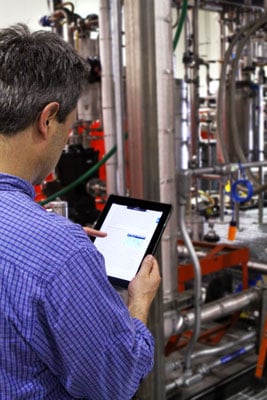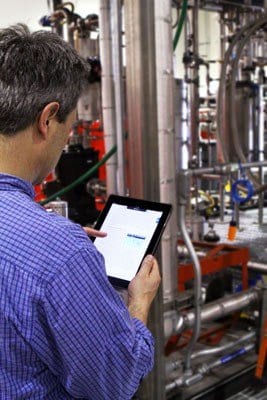The speed at which we acquire and share information is increasing daily. Consumers  across America can access email, check social media profiles and text, all while holding a conversation. Smart phones, tablets and laptops make it easy to share information and to have constant access to it. Manufacturing plant floors are no exception to this trend. While having industrial PC’s or laptops on the factory floor is nothing new, the use of mobile tablets is a new and growing trend.
across America can access email, check social media profiles and text, all while holding a conversation. Smart phones, tablets and laptops make it easy to share information and to have constant access to it. Manufacturing plant floors are no exception to this trend. While having industrial PC’s or laptops on the factory floor is nothing new, the use of mobile tablets is a new and growing trend.
Tablets allow workers to have information at their fingertips no matter where they are within the manufacturing facility. The move towards application based programs allows tablets to be quickly customized for different companies or even different areas within a factory. The also eliminate issues faced by laptops – namely weight and requiring a surface area to be set upon. But what makes tablets so appealing for the manufacturing environment? And what are the issues tablet users still face? Will they be eclipsed by “Kinect” like motion based technology? The left column on the chart below lists common uses for tablets on the factory floor, and the right column lists some drawbacks or limitations of this technology in the manufacturing environment.
TABLET USES IN MANUFACTURING:
- Enterprise Resource Planning (ERP) applications
- Material movement tracking
- Key performance indicator tracking
- Instant production report access
- Real-time equipment alerts
- Quality control and inspection report access
- Process control
- Inventory control
- Access to corporate data on the plant floor
- Centralized data management with mobile access points
- Remote control of lines or machines
- Parts ordering and allocation
- Visual or animated work instructions available instantly
- Real time instruction updates
- Real-time order request access
- Instant confirmation of changes
- Eliminates manual inventories and quality reports
- Assembly instructions
- MSDS sheet access 24/7
- Employee email access
- Fill out help requests or work requests on site
- Document instances while they are happening
|
POTENTIAL DRAWBACKS TO TABLET USE:
- Durability – Most tablets have not been proven to be able to withstand tough environments that sometimes occur in manufacturing facilities. Many are still susceptible to water exposure, heat exposure or hazardous conditions. There are tablet cases available that help tablets survive being dropped, such as the Otterbox.
- Security – The security of a mobile tablet can be less than that of a normal PC. For starters, it’s easy to carry off. Some companies get around this by making the tablet a remote access point to a centralized data system, meaning that no information is actually stored on the tablet itself. Others physically attach the tablets to movable carts or commonly used pieces of equipment, such as forklifts.
- Limited functionality – tablets may be limited by available apps. In most cases, tablets can be programmed the same way a PC would be to make up for these gaps in functionality, but this requires more work and expertise. There are admittedly less programs available for tablets, but the number of applications increases everyday. Some companies such as SAP, Rockwell Automation, AspenTech, and RedPrairie have developed mobile applications already, and their competitors are sure to follow suite soon.
- Lack of Keyboard – some users prefer keyboards for inputting information. While separate keyboards can be purchased as part of the tablet cover or as separate wireless accessories, this does create more bulk.
- Personal applications – You probably don’t want your employees playing “Angry Birds” instead of working. This problem can be solved by blocking personal application downloading abilities.
- Internet access – tablets require Internet access to run applications. Wireless warehouse management systems can be installed, or normal routers, in order to provide the required access, but tablet users may experience issues with wireless range and interference; this could be a major problem if the tablet is being used to run critical manufacturing processes. Wireless speed is another potential problem with mobile tablets that can be circumvented in traditional computers through direct cord connections.
- Corded charging – currently, most tablets require a physical connection to the wall for charging. Inductive charging would give tablets a major advantage over PC counterparts. Recently, HP has come out with an with an inductively chargeable tablet and this is a technology that we should see becoming popular in the next couple of years.
|
Frank McCormack, Process Engineer at EPIC Systems, Inc. has this to say about tablet technology in manufacturing:
“Tablets are now the rage and this technology enables more portability as well as more application thought – the classic how can I break it safely? Actual criteria to evaluate before usage should include: “Are you sure” verifications in manufacturing applications, inductive charging, and wireless range. Each increment of technology gives benefits that are far reaching. As process engineers we need to meet the needs of clients as well as provide technologies that are reliable and safe.”
EPIC Systems, Inc. is an engineering firm and line integrator based out of St. Louis, Missouri that provides solutions for manufacturers. To learn more about EPIC, visit our website or contact an engineer today.
 across America can access email, check social media profiles and text, all while holding a conversation. Smart phones, tablets and laptops make it easy to share information and to have constant access to it. Manufacturing plant floors are no exception to this trend. While having industrial PC’s or laptops on the factory floor is nothing new, the use of mobile tablets is a new and growing trend.
across America can access email, check social media profiles and text, all while holding a conversation. Smart phones, tablets and laptops make it easy to share information and to have constant access to it. Manufacturing plant floors are no exception to this trend. While having industrial PC’s or laptops on the factory floor is nothing new, the use of mobile tablets is a new and growing trend.